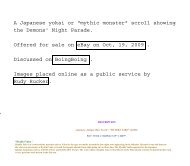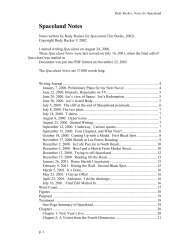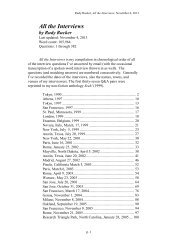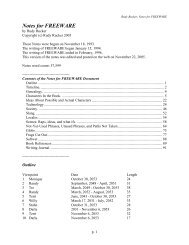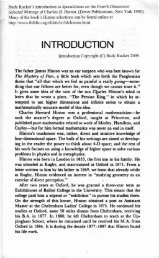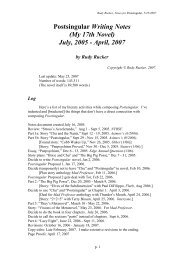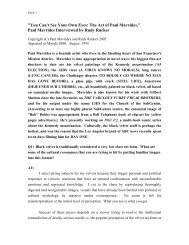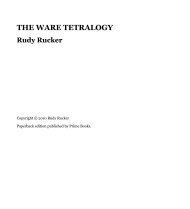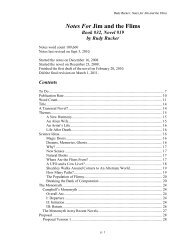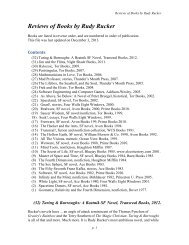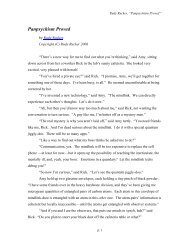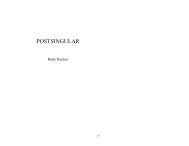Notes for the Lifebox, the Seashell, and the Soul - Rudy Rucker
Notes for the Lifebox, the Seashell, and the Soul - Rudy Rucker
Notes for the Lifebox, the Seashell, and the Soul - Rudy Rucker
Create successful ePaper yourself
Turn your PDF publications into a flip-book with our unique Google optimized e-Paper software.
<strong>Notes</strong> <strong>for</strong> The <strong>Lifebox</strong>, <strong>the</strong> <strong>Seashell</strong>, <strong>and</strong> <strong>the</strong> <strong>Soul</strong>, by <strong>Rudy</strong> <strong>Rucker</strong><br />
Stephen Wolfram’s four classes of computation.<br />
When I first met Stephen Wolfram, I was an unemployed cyberpunk writer. I found<br />
his work so interesting that, half an hour after I’d met him, I’d decided to dive back into<br />
academia <strong>and</strong> become a computer scientist.<br />
As <strong>the</strong> years went by, I ran into Stephen a number of times around Silicon Valley.<br />
Somehow he <strong>and</strong> I always remained friends.<br />
To me, one of <strong>the</strong> most interesting things about his work is that he is pushing so hard<br />
int two diametrically opposite directions. In creating <strong>and</strong> promoting his Ma<strong>the</strong>matica<br />
software <strong>for</strong> symbolic computation, Stephen has perfected <strong>the</strong> old style of <strong>for</strong>mula-based<br />
science. But his <strong>the</strong>oretical work in A New Kind of Science explicitly denies <strong>the</strong> ultimate<br />
validity of <strong>the</strong> <strong>for</strong>mula-based approach that Ma<strong>the</strong>matica makes possible.<br />
If a large part of physical <strong>and</strong> mental reality can be built up from computations, it’s<br />
instructive to look at what kinds of computation can occur.<br />
Now we might think that <strong>the</strong> computations that simulate reality are very carefully<br />
constructed. But <strong>the</strong> same generic behaviors occur in all kinds of computation.<br />
It’s instructive to look at what computations do if we simply pick <strong>the</strong>m at r<strong>and</strong>om<br />
ra<strong>the</strong>r than looking at ones specifically designed to do something.<br />
Restate Wolfram’s taxonomy in terms of chaos.<br />
Intrinsic R<strong>and</strong>omness<br />
There’s a popular belief that chaos is “about” excavating digits from initial<br />
conditions. In reality, nothing can be measured to more than at most thirty decimal places —<br />
all of which get used up in <strong>the</strong> first few minutes of a chaotic process. As Wolfram points out,<br />
seeming r<strong>and</strong>omness stems nei<strong>the</strong>r from initial conditions nor from jostling by <strong>the</strong><br />
environment. Complex computational processes create <strong>the</strong>ir own r<strong>and</strong>omness. What’s really<br />
significant about chaos is not <strong>the</strong> sensitive dependence on initial conditions enthroned as <strong>the</strong><br />
mythical “butterfly effect,” but ra<strong>the</strong>r <strong>the</strong> fact that events cluster upon strange attractors —<br />
which usually are fractals.<br />
Even though <strong>the</strong> steps are deterministic, it can be hard to see very far into <strong>the</strong> future<br />
when watching such a process. Turing’s work on this subject; <strong>the</strong> Halting Problem.<br />
R<strong>and</strong>omness, chaos, <strong>and</strong> computational universality.<br />
Used a scientific instrument in this fashion, <strong>the</strong> computer is a bit like a microscope, a<br />
device that lets <strong>the</strong> user peer into unknown new worlds — albeit a microscope must needs on<br />
some object in <strong>the</strong> external world, while a computer can be fruitfully focused on its own self.<br />
The Principle of Computational Equivalence.<br />
Fur<strong>the</strong>r distinctions prove significant. Many kinds of computational devices are<br />
“universal” in <strong>the</strong> sense that, given <strong>the</strong> appropriate software, <strong>the</strong>y can simulate any o<strong>the</strong>r<br />
computation. It turns out that universality is in fact very common among all sorts of<br />
computing devices. Many physical systems — such as <strong>the</strong> patterns on a seashell or <strong>the</strong><br />
ripples in a brook — are <strong>the</strong>mselves universal. This in turn implies that <strong>the</strong> world is harder<br />
to predict than we may have imagined.<br />
p. 25




